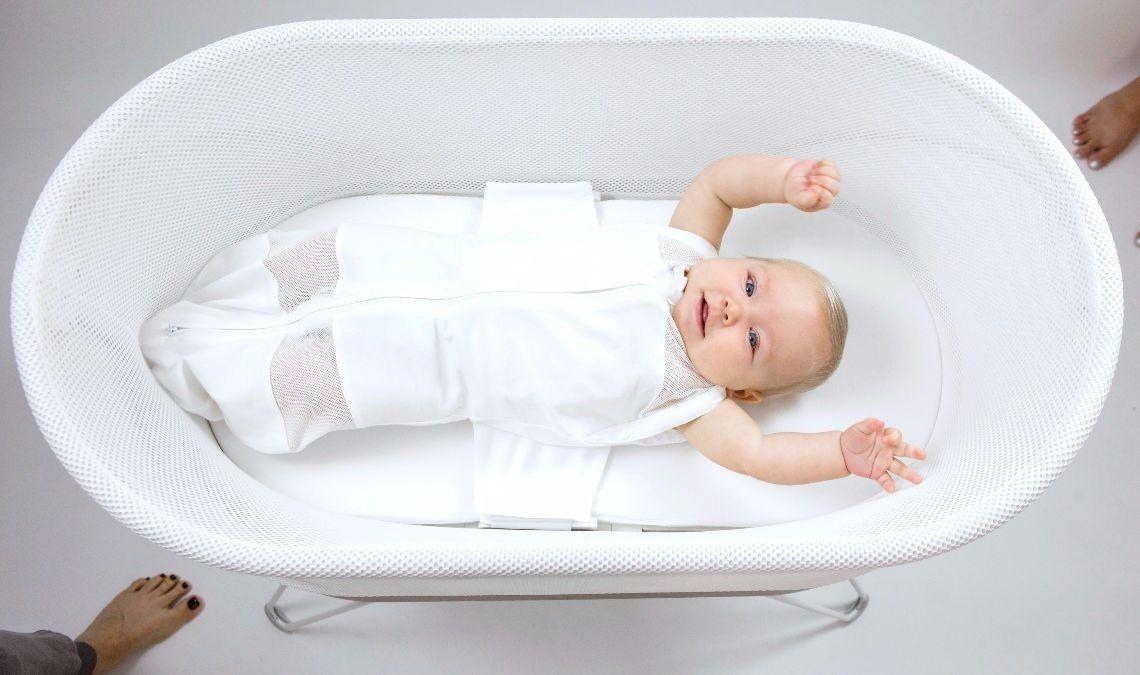SNOO
How to Transition Baby from SNOO to a Cot—3 Easy Steps
3 easy steps to make the transition a breeze!

Written by
Dr. Harvey Karp

SHARE THIS ARTICLE
PARENT PICKS
Bestsellers
SNOO

Written by
Dr. Harvey Karp

SHARE THIS ARTICLE
Bestsellers
Trading the bottle for a cup, going from two naps to one, moving from daycare to preschool…all of these important transitions can be hard on a little one! But transitioning your baby from SNOO to the cot doesn’t have to be hard…but I know parents are worried. In fact, “How hard is it to transition babies to a cot from SNOO bassinet?” is one of the top questions parents ask me about SNOO—and I LOVE that I can answer “It’s easy-peasy!” Simply follow my how-tos:
The award-winning SNOO Smart Sleeper was designed for babies up to 6 months old—or until your little one can get on their hands and knees. It’s safe and recommended to keep your baby sleeping in SNOO up until either of those milestones happen.
SNOO was designed to comfortably fit a baby up to 33 pounds—which leaves lots of wiggle room for the average 6-month-old (who is usually well under 30 inches and 25 pounds, according to the World Health Organisation). And, surprise, even if your baby’s toes touch the bottom of SNOO, it’s a good bet that your baby still fits in SNOO. Here’s why:
Every baby is unique and some little ones take a bit longer to wean from SNOO’s all-night, responsive motion than others. But rest assured, a 5- or 6-month-old’s brain is much more mature than a newborn’s, which means they can sustain long, continuous periods of sleep without the need for rocking or swaddling. (Their sleep, however, still greatly benefits from white noise.)
Let me explain: In utero, babies are rocked with every breath and every step. They love the constant rumbling sound, rhythmic motion, and snug embrace that the womb provides. Those sensations (part of the 5 S’s) soothed them to sleep before they were born and continue to soothe them to sleep during the first months of their life, or the fourth trimester.
That’s why spending sleepytime in a still and silent room is so strange for babies…and can actually cause them to wake more often.
BUT once your baby reaches 5 or 6 months old, they have naturally outgrown their deep love for—and reliance on—motion and swaddling. So, have no fear, your 6-month-old baby does not crave the rocking like they used to—and they’re ready for the cot!
If your baby is between 5 and 6 months old—or they can get to their hands and knees—you’re ready to start weaning your little one from SNOO! Here’s how…
Take a peek at the shoulders of your SNOO Sack. There you’ll find snaps. Undo the snaps on one side of the swaddle and let one of your child’s arms out of the SNOO Sack. Start with just one arm free and see how your baby sleeps. If they wind up startling themselves awake, don’t fret! Simply go back to both arms swaddled and try one-arm-out again in a week.
After a few nights of good sleep with one arm out, you can free the other arm. (PS: When you release your baby’s arms, continue to fasten the inner bands snugly around your lovebug’s midsection.)
Once your baby is sleeping well with both arms out, it’s time to turn on SNOO’s Weaning Mode (one of the Premium App features that are included with your SNOO when you buy or rent directly from Happiest Baby or an authorised partner!). About a week before you want to move your baby out of SNOO and into a cot, go into your Happiest Baby App and:
You can tell Weaning Mode was successfully turned on by heading to the SNOO Dashboard page. There will be a “W” at the top-right hand corner. In Weaning Mode, SNOO will continue to give your sleeping baby soothing sounds—but no motion—all sleep long. The motion only comes back on if your baby cries. At that point, your trusty SNOO will respond as usual—with motion and sound—until your baby is soothed…and then gradually returns to some sound, but no motion.
Continue with Weaning Mode for about one to two weeks, so your baby can get used to sleeping in a still bed.
If your baby has been sleeping great with both arms free and Weaning Mode for about one to two weeks, you’re ready to make the transition to the cot! Here’s how to make the big move most successful:
Remember, there is no rush to wean your baby from SNOO! Parents who try to transition from SNOO to the cot at 3 or 4 months often find their baby does well initially…only to have their sleep disrupted by a sleep regression or a growth spurt. I recommend you wait to start weaning until 5 or 6 months.
That said, some babies start to get ready for arms-out around 3 to 4 months. (Before then, babies simply don’t have enough motor control over their arms, so they bonk themselves awake a lot.) But if your baby wakes themselves up when their arms are free, they’re just not ready to transition yet…and that is okay! You want to make sure you go at your baby’s pace.
For many parents, the transition to cot coincides with transitioning Baby to their own room, as well. (It’s recommended that you sleep with Baby in your room for at least 6 months.) If that’s the case, it’s important to familiarise your baby with their room—and build happy memories there—during the day…even if you don’t end up moving them into the nursery right now. That means enjoy some quiet play, storytime, and snuggles in the nursery before you move your baby to their room.
Here, a few parents share their first-hand accounts of weaning from SNOO:
“We turned on the weaning feature a couple of weeks before we planned to move our baby to the cot. I was worried about the first night, but it went really well! (We always bumped the level up to purple and let it gradually come back to the blue level—with sound, but no motion. He was always asleep before SNOO stopped moving.) The switch was seamless and he has slept through the night ever since. Couldn’t be happier!” –Molly
We took the transition slow, we started with one arm out for a week, then two arms out for a few weeks, and then finally turned on the weaning mode. We kept our daughter in SNOO on weaning mode for about three weeks and then finally made the move to her crib when she turned 6 months old. She transitioned to her crib better than I could have ever imagined from the first night. I 100% recommend this product to any and every parent. –Jessica G.
Weaning him off was so easy with the weaning feature as well so we had no problem at all switching him to his cot. This was the only product we spent big money on and it was so worth it! –Keagan H.
The weaning feature helped when she was 5 months. At 6 months, she was ready for her cot. It took a few nights for her to get used to her new surroundings, but now she is back to her 11 to 12 hour stretches. Thank you SNOO! My baby learned all of her good sleeping habits from you! –Anonymous
Disclaimer: The information on our site is NOT medical advice for any specific person or condition. It is only meant as general information. If you have any medical questions and concerns about your child or yourself, please contact your health provider. Breastmilk is the best source of nutrition for babies. It is important that, in preparation for and during breastfeeding, mothers eat a healthy, balanced diet. Combined breast- and bottle-feeding in the first weeks of life may reduce the supply of a mother's breastmilk and reversing the decision not to breastfeed is difficult. If you do decide to use infant formula, you should follow instructions carefully.